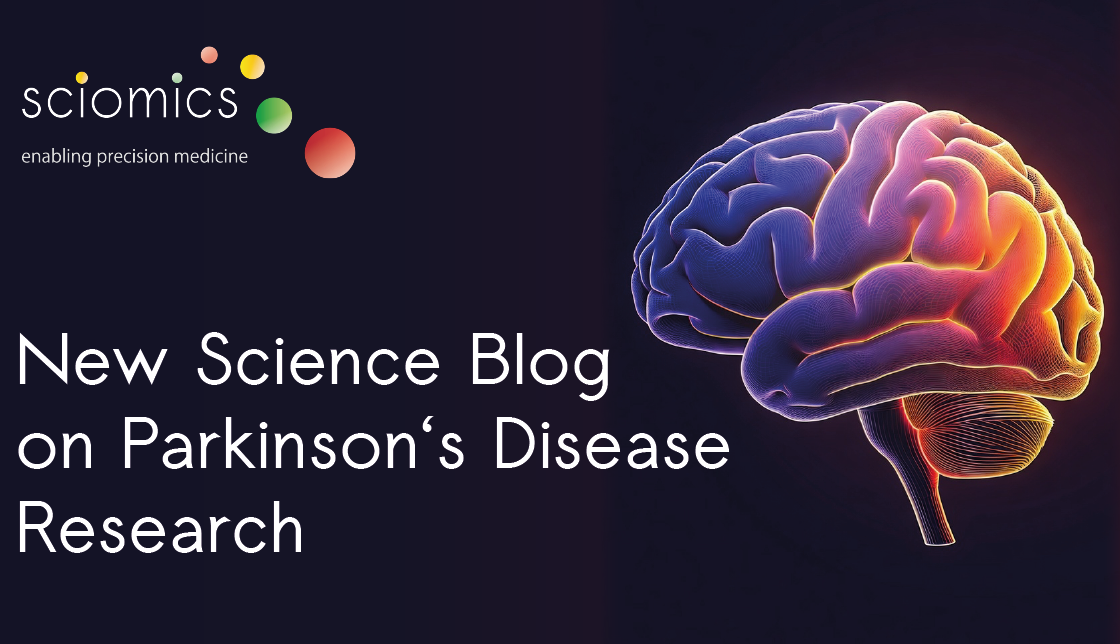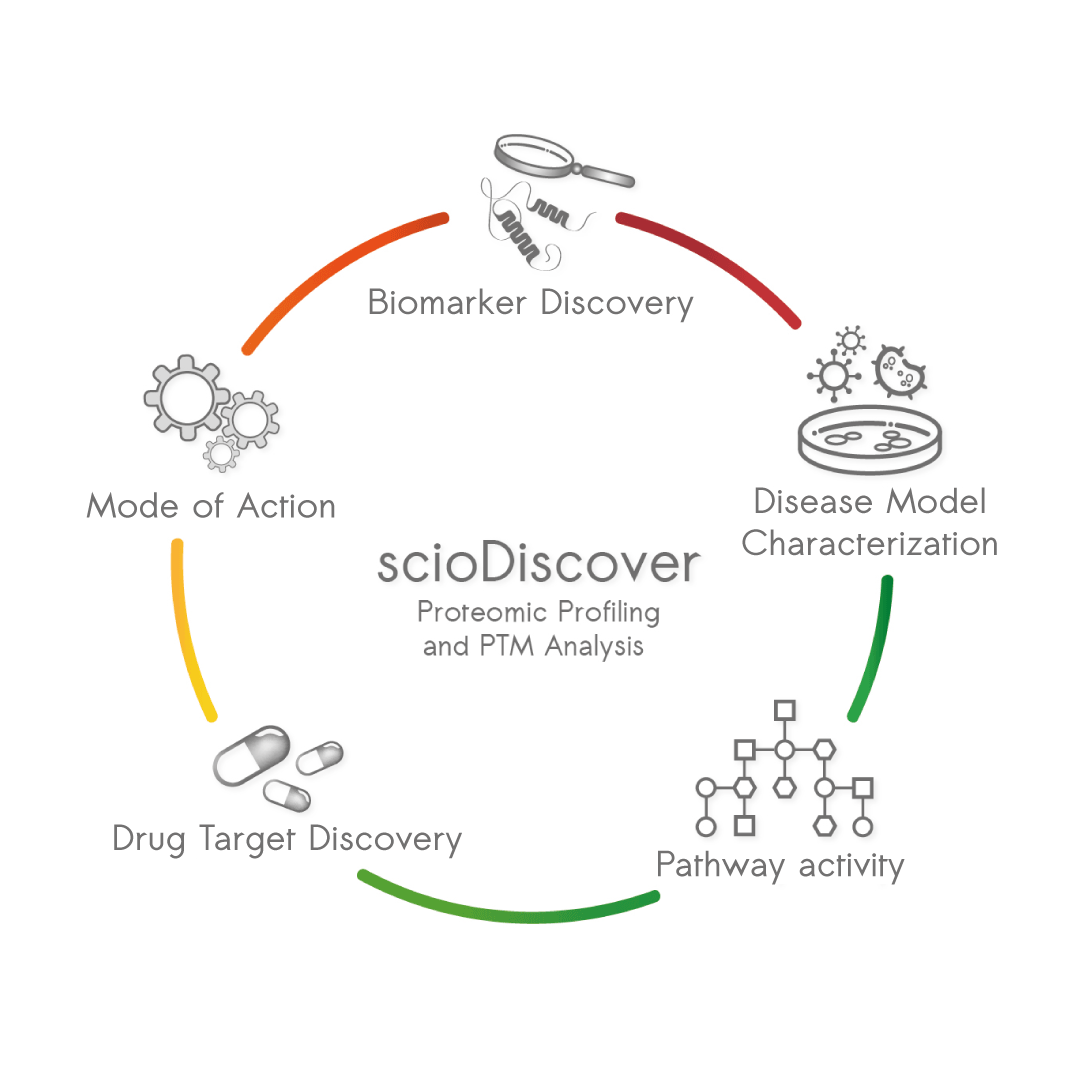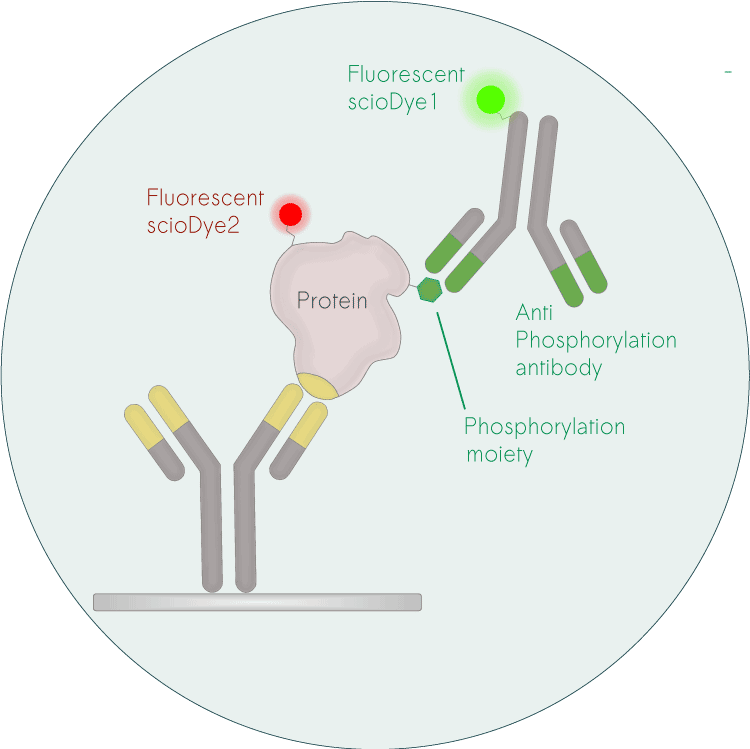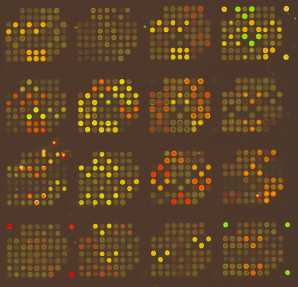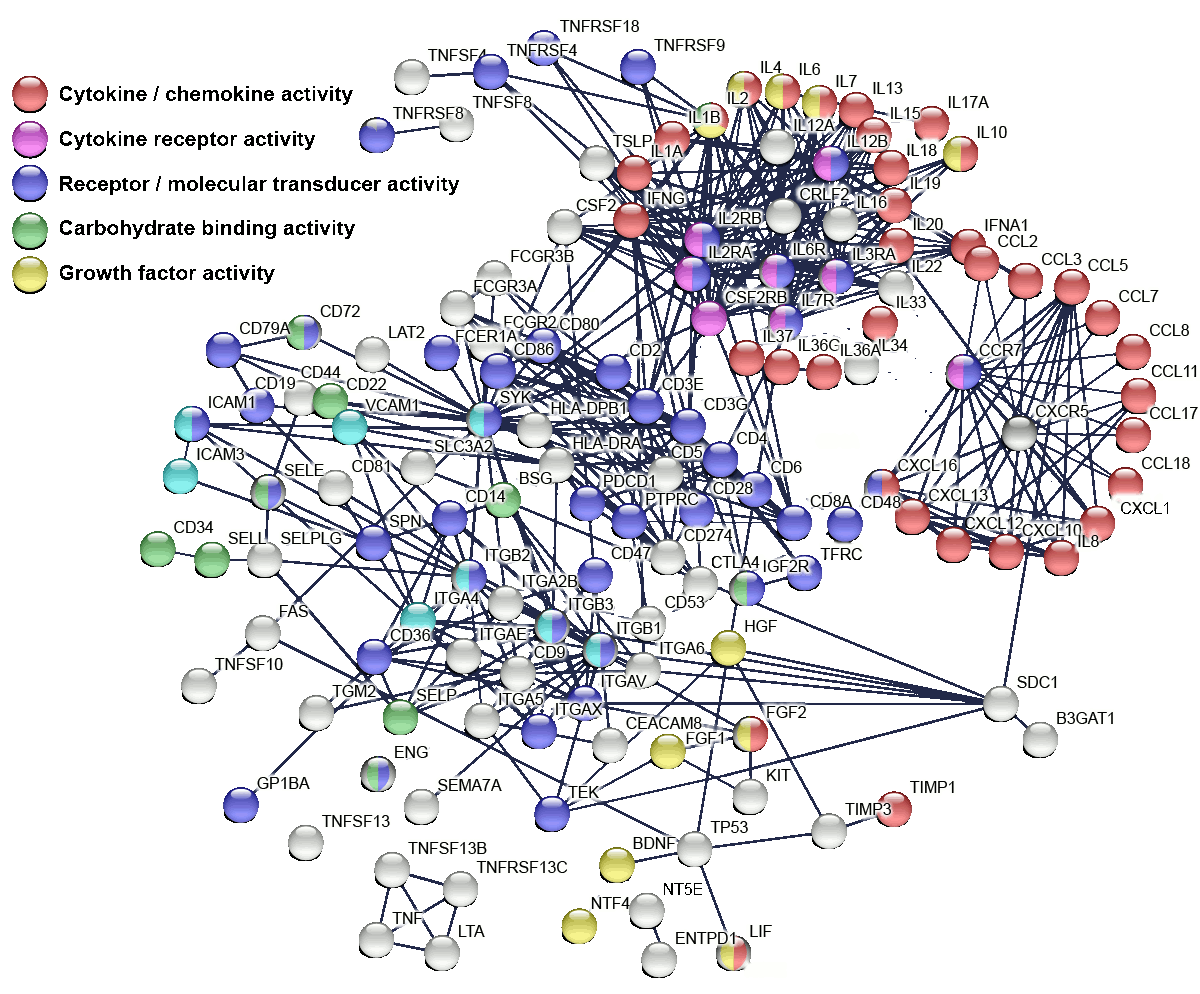Proteomics - Empowering Science and Precision Medicine
 Enabling Precision Medicine
Enabling Precision Medicine
Protein profiling is essential in modern biomedical research. The aim is improving patients' quality of life by utilizing molecular signatures to guide diagnosis and treatment.
At Sciomics, we consider ourselves scientists dedicated to improving medical care. We believe our exploratory proteomic and post-translational modification profiling platform drives significant advancements in Precision Medicine. By supporting other scientists with our expertise and by conducting our own research, we are utilizing our protein profiling expertise to the fullest.
Our Scientific Protein Profiling Services
We provide scientific high-content protein profiling services based on our antibody microarray platform. The analysis is based on either our fixed-contentarray portfolio (scioDiscover, scioCyto, scioCD) or customized antibody arrays. The protein abundance measurement of more than 1,400 proteins can be extended by a parallel analysis of their corresponding phosphorylation status (scioPhospho) or ubiquitination status (scioUbi). For your convenience and fast usability of the results, our service always includes an in-depth bioinformatic data analysis and a detailed scientific study report. Our protein analysis platform reduces the cost and attrition rate in your protein biomarker development as well as in pre-clinical evaluations of compounds through in-depth insights on the relevant level of proteins.
Main Advantages of Our Protein Profiling Platform
-
High-content analysis: over 1400 proteins are analyzed in parallel
-
Broad coverage of key pathways and diseases
-
Widely applicable for biomarker discovery, mode-of-action analysis, disease mechanism studies etc.
-
A wide range of samples can be analyzed and data-integrated, such as plasma, serum, CSF, ISF, cellular models, organoids, and tissue samples
-
Fully immune-based platform: results are easily translatable to other immune-based platforms
-
Post-translational modification analysis available
-
Complete package: study design, data collection, data analysis and customized study report
-
Minimal sample amounts required
Common Scientific Applications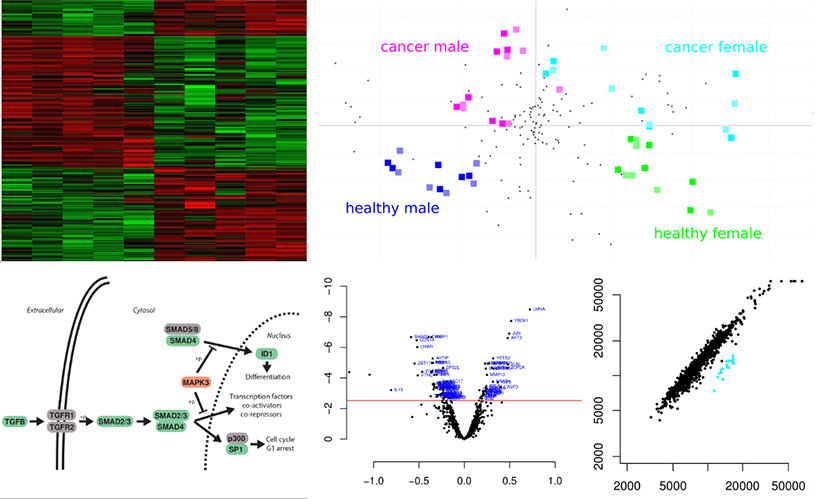
-
Drug target discovery
-
Mode-of-Action analysis
-
Preclinical assessment and benchmarking of novel compounds
-
Cytokine profiling and immune response profiling
-
Pathway profiling and pathway activity profiling
-
Characterization and selection of cell culture or animal models
-
Immune response profiling
Our Protein Biomarker Discovery and Development Pipeline
To enable Precision Medicine and to improve diagnostic research, we need techniques to discover and validate novel and more accurate biomarkers. We have built a broad biomarker development pipeline in Oncology, Infectious Diseases and Organ Failure. Our platform is also well suited to advance biomarker discovery across a broad range of other fields or applications, such as neurodegenerative diseases and aging. Our immune-based discovery service for protein biomarkers (scioDiscover) utilizes complex antibody microarrays covering crucial pathway proteins for multiple diseases as well as secreted proteins. The results are easily translatable to other immune-based platforms for further validation and diagnostic use, such as ELISA, CLIA or LFDs. Thereby, our fully immune-based workflow reduces the cost and attrition rates of biomarker discovery studies.
With more than a decade of experience in protein biomarker discovery and validation, Sciomics is an excellent and dedicated partner for your biomarker project.
Acute Kidney Injury - Early and Precise Diagnosis for a Better Outcome
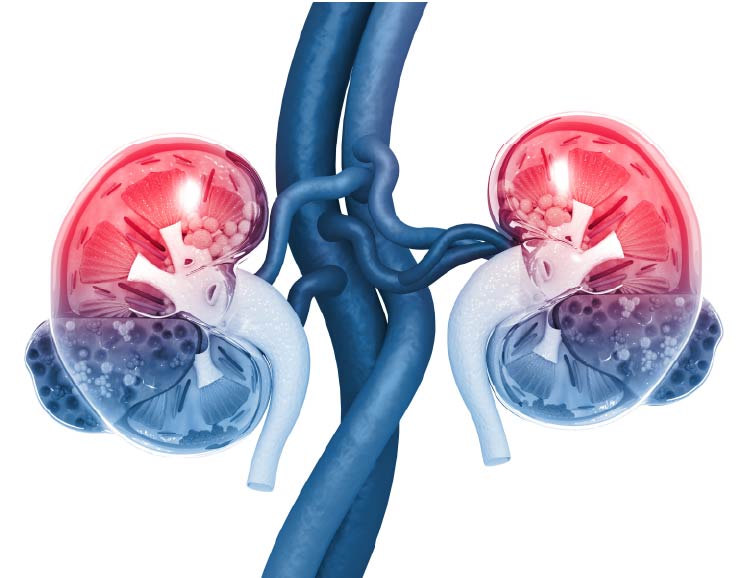 Acute kidney injury (AKI) is a sudden loss of kidney function that often occurs as a complication caused by major surgeries, drug side effects and other factors. It is a serious complication in hospitals, affecting more than 50% of intensive care patients and 21% of all hospitalized patients. To date, standard diagnostics based on serum creatinine and its derivative eGFR can only detect damage to a patient's kidneys that has already occurred. This is as late as 2-3 days after major surgery.
Acute kidney injury (AKI) is a sudden loss of kidney function that often occurs as a complication caused by major surgeries, drug side effects and other factors. It is a serious complication in hospitals, affecting more than 50% of intensive care patients and 21% of all hospitalized patients. To date, standard diagnostics based on serum creatinine and its derivative eGFR can only detect damage to a patient's kidneys that has already occurred. This is as late as 2-3 days after major surgery.
We at Sciomics want to change this. Our internal biomarker development pipeline, including the scioAKI project, is based on our scioDiscover platform. This platform enables a robust combination of proteomics data with AI approaches to define high performance biomarker panels, both in terms of sensitivity and specificity. We are currently building a new company to bridge the gap between biomarker discovery, verification and the launch of our biomarker panels as IVD applications.
Our most advanced project is scioAKI - a four-protein biomarker panel for the early and precise diagnosis of AKI. Based on the scioAKI panel, an accurate diagnosis could be possible as early as 24 hours after major surgery. It was identified using machine learning approaches on blood proteomics data derived from a large clinical cohort using scioDiscover. We have demonstrated the outstanding accuracy of scioAKI in a clinical study involving 500 patients undergoing three different types of major surgery (major cardiac surgery, lung transplantation or kidney transplantation).
Our next goal is to develop an IVD for point-of-care testing. We welcome partners to join our mission: Saving kidneys, saving lives!
COVID-19 Biomarkers – Early Stratification for Better Health Care 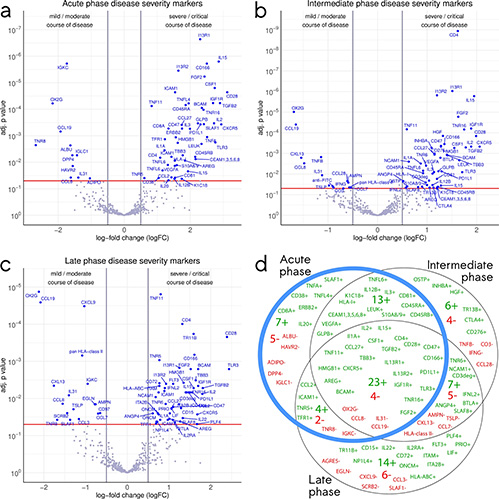
In order to improve the situation in the COVID-19 pandemic, we conducted a biomarker study to support medical care and reduce the burden on the healthcare system. We discovered and systematically evaluated early biomarkers that predict the progression to severe or critical COVID-19 disease at symptom onset. Using the Sciomics antibody microarray platform, we identified plasma protein biomarkers that can predict severe COVID-19 disease during an early phase of SARS-CoV-2 infection. Evidence suggests that these markers are associated with mechanisms involved not only in the progression to severe COVID-19, but also in other infectious diseases. Early stratification of patients at high risk of developing severe or even critical disease could assist in making informed treatment and care decisions, ultimately improving medical interventions and reducing the burden on the healthcare system.
For more information regarding our protein biomarker pipeline, please contact us.

